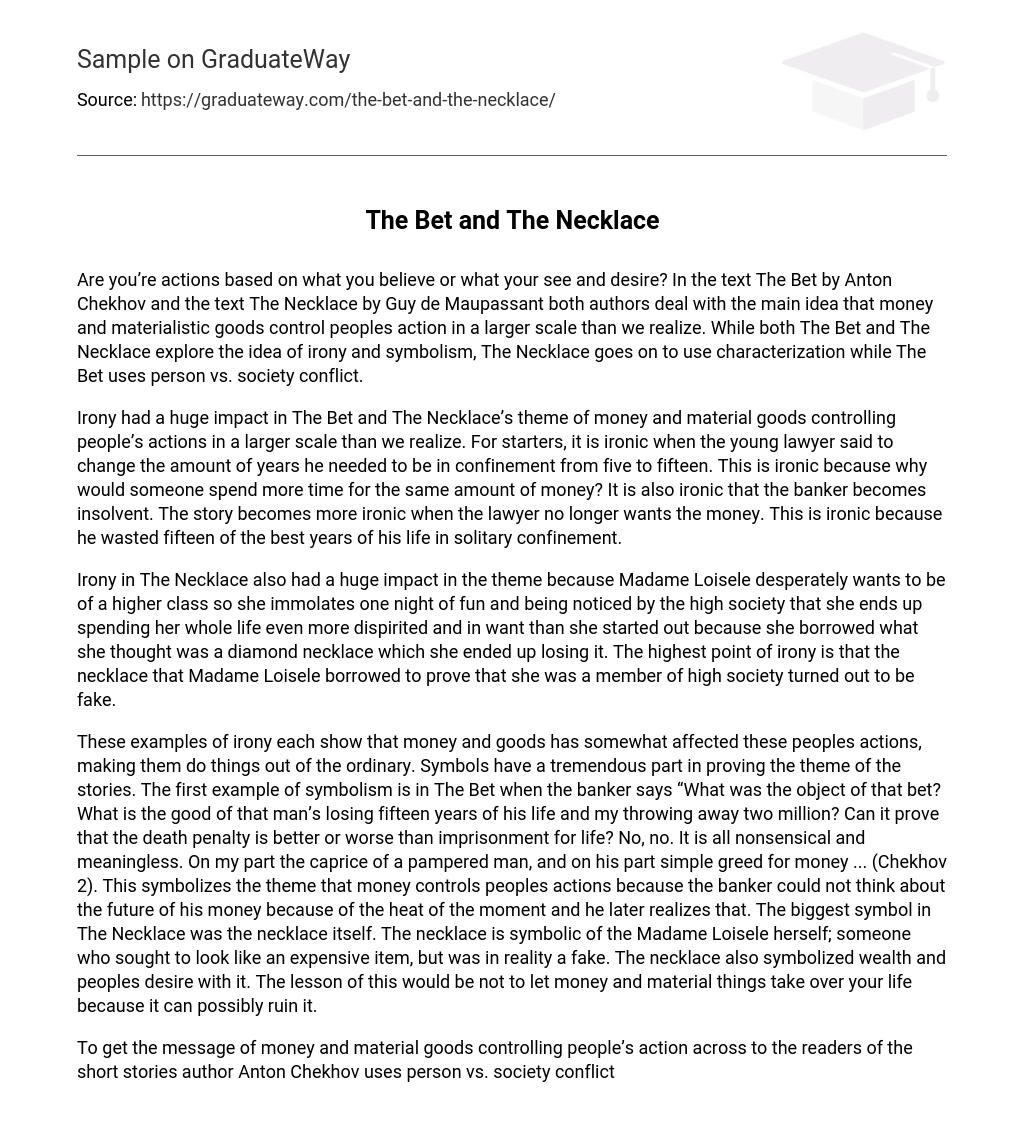Are you’re actions based on what you believe or what your see and desire? In the text The Bet by Anton Chekhov and the text The Necklace by Guy de Maupassant both authors deal with the main idea that money and materialistic goods control peoples action in a larger scale than we realize. While both The Bet and The Necklace explore the idea of irony and symbolism, The Necklace goes on to use characterization while The Bet uses person vs. society conflict.
Irony had a huge impact in The Bet and The Necklace’s theme of money and material goods controlling people’s actions in a larger scale than we realize. For starters, it is ironic when the young lawyer said to change the amount of years he needed to be in confinement from five to fifteen. This is ironic because why would someone spend more time for the same amount of money? It is also ironic that the banker becomes insolvent. The story becomes more ironic when the lawyer no longer wants the money. This is ironic because he wasted fifteen of the best years of his life in solitary confinement.
Irony in The Necklace also had a huge impact in the theme because Madame Loisele desperately wants to be of a higher class so she immolates one night of fun and being noticed by the high society that she ends up spending her whole life even more dispirited and in want than she started out because she borrowed what she thought was a diamond necklace which she ended up losing it. The highest point of irony is that the necklace that Madame Loisele borrowed to prove that she was a member of high society turned out to be fake.
These examples of irony each show that money and goods has somewhat affected these peoples actions, making them do things out of the ordinary. Symbols have a tremendous part in proving the theme of the stories. The first example of symbolism is in The Bet when the banker says “What was the object of that bet? What is the good of that man’s losing fifteen years of his life and my throwing away two million? Can it prove that the death penalty is better or worse than imprisonment for life? No, no. It is all nonsensical and meaningless. On my part the caprice of a pampered man, and on his part simple greed for money … (Chekhov 2). This symbolizes the theme that money controls peoples actions because the banker could not think about the future of his money because of the heat of the moment and he later realizes that. The biggest symbol in The Necklace was the necklace itself. The necklace is symbolic of the Madame Loisele herself; someone who sought to look like an expensive item, but was in reality a fake. The necklace also symbolized wealth and peoples desire with it. The lesson of this would be not to let money and material things take over your life because it can possibly ruin it.
To get the message of money and material goods controlling people’s action across to the readers of the short stories author Anton Chekhov uses person vs. society conflict, while author Guy de Maupassant uses characterization. In The Bet one of the main characters, the young lawyer faces world hatred. He states his hatred and despise for the world in a letter he wrote before he was released out of solitary confinement. “Your books have given me wisdom. All that the unresting thought of man has created in the ages is compressed into a small compass in my brain.
I know that I am wiser than all of you. And I despise your books, I despise wisdom and the blessings of this world. It is all worthless, fleeting, illusory, and deceptive, like a mirage. You may be proud, wise, and fine, but death will wipe you off the face of the earth as though you were no more than mice burrowing under the floor, and your posterity, your history, your immortal geniuses will burn or freeze together with the earthly globe… “To prove to you in action how I despise all that you live by, I renounce the two million of which I once dreamed as of paradise and which now I despise.
To deprive myself of the right to the money I shall go out from here five hours before the time fixed, and so break the compact … ” (Chekhov 4,5) This letter written to the banker that he made the bet with 15 years before, the lawyer is showing how the bet he made in the spur of the moment, for a mere two millions dollars made him despise society and even despise himself. Characterization in The Necklace helps show the theme of the story because the main character Mathilde is an insecure woman, who feels the need to own expensive material goods to fit in with a society that she is not apart.
For example when her husband brings her invitation to a party rather than be happy she is upset that she has nothing to wear. This leaves the husband heartbroken. The story also shows the husband is self-less and would give up buying something he desires to buy her a dress. These two different literary devices still get the same message across to the readers. The Bet and The Necklace both try to get the same message of money and material goods controlling people’s actions in larger scale than most realize.
The Bet and The Necklace share the literary device irony and symbolism while The Necklace has characterization and The Bet uses person vs. society conflict. Moral is don’t let money and material goods dictate your actions but, let your mind and what you believe is right.
Work Cited
Chekhov, Anton, The Bet. Canada: Oxford University Press, 2001. De Maupassant, Guy, The Necklace. Canada: Oxford University Press, 2001.





